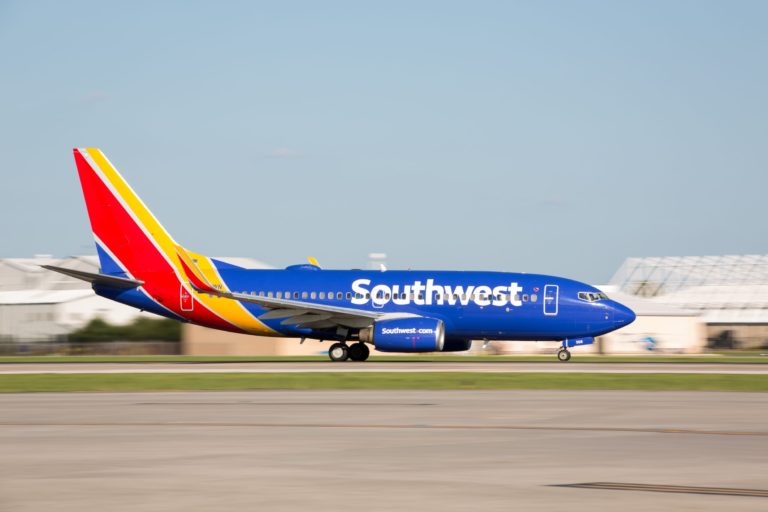Editor’s Note: The stock market will be closed next Monday, January 16, for Martin Luther King, Jr. Day. The InvestorPlace offices and customer service department also be closed on Monday. We hope you enjoy the long holiday weekend!
The holidays are over, and with them, holiday travel. But Southwest Airlines Co. (NYSE:LUV) is still facing turbulent times after its holiday travel meltdown.
As you may know, severe weather covered much of the country in multiple feet of snow over the Christmas holiday and caused large scale flight cancellations. Chicago and Denver – where the winter storm hit especially hard – have two of Southwest’s biggest hubs, the Chicago Midway airport and Denver International airport.
So, due to nature and bad luck, Southwest became the holidays’ most-affected U.S. airline for flight cancellations, with 16,700 flights cancelled between December 21 and December 31. The airlines cancelled about two-thirds of its flights the week after Christmas, more than other major airlines.
So, why was Southwest hit so hard?
Well, the weather exacerbated problems that Southwest has already been having. Southwest is a low-cost carrier, meaning that it provides the lowest prices for the most popular routes. It therefore tends to be cheaper than the Big Three airlines, American Airlines Group Inc. (AAL), Delta Air Lines, Inc. (DAL) and United Airlines Holdings, Inc. (
UAL).
To help make up for the holiday fiasco, Southwest last week announced that it would offer 25,000 Rapid Rewards points – about a $300 value – to travelers whose flights were cancelled or delayed for more than three hours between December 24 and January 2. Passengers who rebooked with Southwest are also eligible for the 25,000 frequent-flier points. The points will never expire and do not have blackout dates.
The rewards points come with their own issues, though, as the cost of a flight changes depending on the week and time of year. So, while some travelers may have the full cost of a new ticket covered, others may not. The points also do not cover other expenses that stranded passengers incurred, such as replacing toiletries and other essentials.
Unfortunately for Southwest, this travel meltdown will cost the airline about $725 million and $825 million. The carrier expects half of the cost to come from revenue lost from cancelled flights and the remaining amount to come from customer reimbursements, the value of 25,000 Rapid Rewards points, and overtime pay for employees.
This spells bad news for Southwest’s near-term fundamentals, as Executive Vice President & Chief Commercial Officer Ryan Green said there “will certainly be an impact to the fourth quarter.” President & Chief Executive Officer Bob Jordan, however, was a bit more optimistic: “We have a 51-year history of doing really well, operating really well,” he said. “This one event, which is significant, won’t define us.”
We’ll find out more about how Southwest’s numbers stack up when it releases its fourth-quarter earnings on January 26. And even though the report does not come out for two more weeks, I want to flag the company for you now, as the analyst community significantly slashed its earnings estimates in the past week.
Earnings estimates had been steadily increasing over the past 90 days. In fact, from 90 to 30 days ago, earnings estimates were revised 45% higher, up from $0.56 per share to $0.81 per share. However, following the holiday flight fiasco, earnings estimates plummeted a whopping 84% from $0.62 per share to $0.10 per share in the past seven days.
The fact that analysts cut their earnings estimates is a red flag, as downward revisions mean that earnings misses could be in the cards. And disappointing earnings results could hit the stock.
With that in mind, let’s see how the company stacks up in Portfolio Grader.
As you can see in the Report Card above, Southwest holds a C-rating, making it a “Hold” right now.
The reality is that the company isn’t out of the woods – or clouds – just yet. On Wednesday morning, an outage of a Federal Aviation Administration (FAA) alert system caused widespread flight groundings.
The FAA’s Notice to Air Missions, or NOTAM, system alerts pilots to conditions that could affect the safety of their flights. These messages could include anything from lights being out on a runway to an airshow taking place nearby. NOTAM is a national system, meaning that flights across the country were grounded before they were cleared to fly again shortly before 9:00 a.m. Eastern time.
And with flights again affected, so were the airlines.
According to FlightAware, a website that tracks real-time flight statuses, there were 8,672 flight delays and 1,268 cancellations as of late Wednesday afternoon. Of these, Southwest had nearly 2,000 delayed flights and over 400 cancelled fights.
Following the announcement of the outage, Southwest fell 2.3% before the opening bell on Wednesday. American Airlines, United and Delta also slipped lower on the news, down, 0.5%, 0.05%, and 0.3%, respectively.
Now, looking longer term, I do expect Southwest to recover. It is a very efficient airline, and I have never had a problem with the carrier since I predominately book direct flights. For the near term, though, I wouldn’t put new money into LUV shares until after the skies have cleared and analysts are more bullish on the company again.
You might be wondering then – what stocks are set to soar?
As I’ve mentioned before, I expect energy stocks to reveal the strongest earnings growth for the fourth quarter and fiscal year 2022 in the upcoming weeks – and as such, these stocks should lead the market higher in the upcoming weeks and months.
Consider this: While the analyst community came back from their ski vacations and lowered earnings estimates for 10 of the 11 S&P 500 sectors, earnings estimates for the energy sector have increased. The energy sector is now expected to post 62.7% average earnings growth for the fourth quarter, compared to previous estimates for 60.8%.
Given that the energy sector will post the best earnings results in the upcoming fourth-quarter earnings season, our Breakthrough Stocks Buy List is already heavily weighted in energy stocks.
This week, another small-cap energy stock hit my screens and I added it to my Breakthrough Stocks Buy List yesterday. The company is set to release its fourth-quarter earnings results in early February, with earnings expected to more than double in the most recent quarter and analysts increasing earnings estimates in the past three months.
Sincerely,

Louis Navellier

